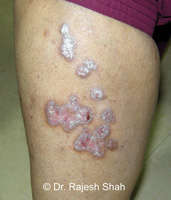Lichen Planus: Long-term overview of Lichen Planus treatment

Lichen Planus is not a dangerous or fatal disease. It is not yet a fully understood disease. Lichen Planus could often be a self-limiting disease, not in every case, though. In some cases, it may spontaneously resolve, but after a few months, not in a few days. The length of time is usually very long, running into years, and it varies from patient to patient. At the same time, it has a peculiar tendency to relapse after some years, maybe two, three, or more.
One of the theories is that Lichen Planus is a pre-cancerous condition. However, it is not yet medically supported by scientific studies. In the cases of oral Lichen Planus, some cases may need a biopsy to rule out cancer. In our experience at Life Force, oral lichen planus rarely converts into cancer. In many cases, clinical judgment helps us to differentiate or predict the risk of having oral lichen planus converting into cancer. A timely biopsy may help to conclude the diagnosis. Some of the complications of Lichen Planus include Alopecia when it affects the scalp. This variety of Lichen Planus is called Lichen Planopilaris where one develops scarred formation leading to complete loss of hair in patches on the scalp. Due to eruptions on the scalp and dryness of the skin due to the blockage of the sweat ducts.
Lichen Planus often becomes a medico-social disorder, especially when it shows up in the visible part of the body, such as on the face. It is uncommon for Lichen Planus to appear on the face.
If Lichen Planus treatment is not done timely, it may simply persist for a long time, such as one year to even 20-35 years, or may spread to different areas of the body. If it is treated using cortisone, it again tends to spread to other parts of the body.
Lichen Planus treatment in conventional medicine is largely through cortisone, dapsone, or cyclosporine. There are three possible outcomes:
a. Temporary recovery
b. Relapse of Lichen Planus on stopping cortisone
c. Spread of Lichen Planus on other areas, even while being on cortisone (Say, from the skin to mouth or genitals)
d. Adverse effects of cortisone
e. Relapse of Lichen Planus after some weeks or months after stopping cortisone, which will be even more resistant (more difficult to treat)
f. Complete remission (less likely)
Lichen Planus treatment entails internal medication targeted at treating the inner, immunological parameters responsible for developing it, which is better achieved using homeopathy.
 (1).gif)
Written & Approved by-
Dr. Rajesh Shah
M.D. (Hom.)